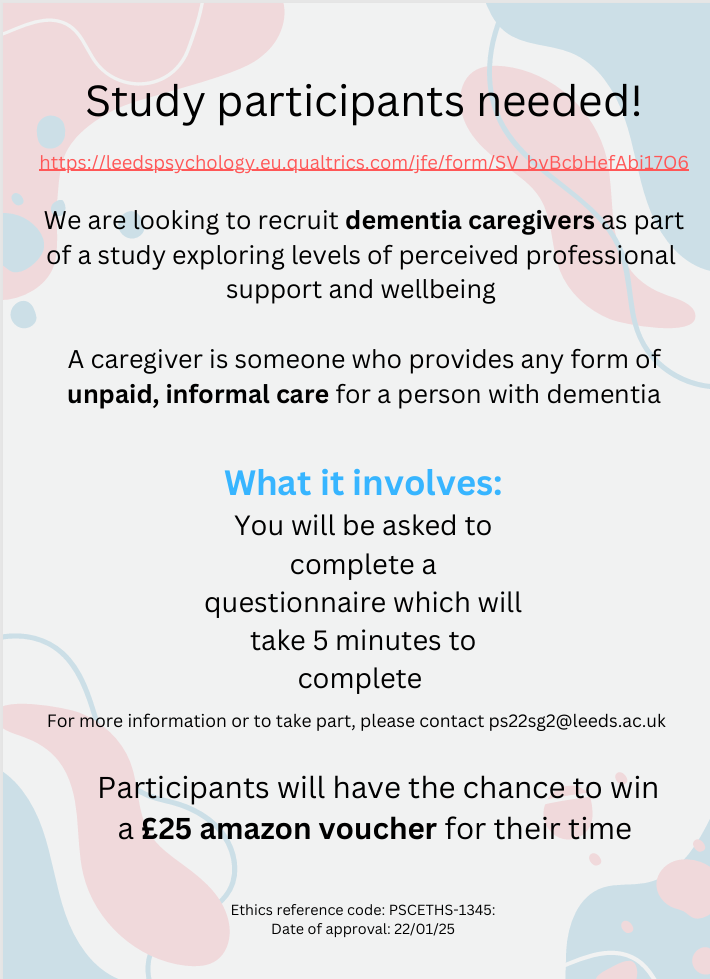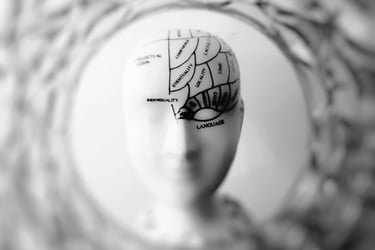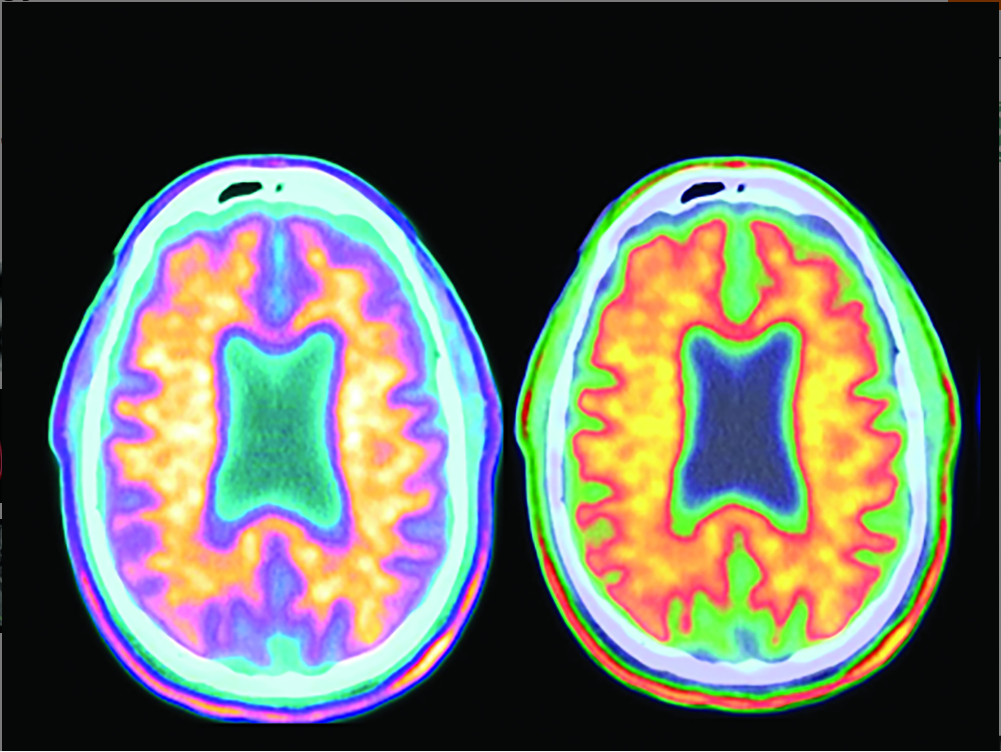Empatia's Blog
Course for Family Members Supporting a Loved One with Dementia.
Do you support a loved one with dementia? Do you sometimes doubt yourself or experience difficult, confusing emotions?
Supporting someone with dementia can feel lonely. I offer clear, evidence-based guidance drawn from many years working as a Dementia Specialist Nurse, alongside connection with a small group of people walking a similar path.
This 10-week course offers clear education, emotional support, and practical understanding to help you adapt without losing yourself.
Together we explore dementia education, identity and adapting to change, communication and behaviour, emotional transitions, and long-term resilience. Each session builds on the last, so participants are encouraged to commit to the full programme, although I do understand the pressures you face and will accommodate this.

Watch Empatia's short video to learn more
Starting 11th March | 10:30 am–12:30 pm
Every Wednesday for 10 weeks
Market Harborough Building Society Head Office,
Newcombe House, The Point,
Market Harborough,
Leicestershire, LE16 7QU
£18 per session
Small group for comfort and quality, limited places.
For more information contact me:
07763 286169
You can also ask a question using the button below.
The Overstone Arms and Empatia Specialist Dementia Coaching's ongoing fundraising initiatives for Rare Dementia Support.


Join Phil from The Overstone Arms and me as we share the many ways we’re fundraising and raising awareness for Rare Dementia Support — from regular radio interviews and community events to education, teaching, and our much-loved weekly quiz.
Weekly Quiz Night Every Tuesday, 8.00–10.00 pm, The Overstone Arms hosts a quiz night with prize money, Open the Box, and Play Your Cards Right, all helping to raise funds for Rare Dementia Support.
Everyone welcome. Last orders for food 19:30.
Coffee Morning – 7 February 2026 We’re grateful to Knit & Knatter, Pytchley, who have kindly knitted twiddle muffs and blankets for people living with dementia. These will be available to buy at The Overstone Arms coffee morning — small, thoughtful items that genuinely make a difference.
Introduction to Dementia & Dementia Risk Factors - Sunday 5 April at 6.00 pm An education evening at The Overstone Arms with Amy of Empatia. For enquiries, contact Amy at Empatia Specialist Dementia Coaching or Phil at The Overstone Arms.
The Overstone Cat 🐾 Meet our lifelike robotic cat, who lives at The Overstone Arms. I loan the cat to clients so they can try it at home before deciding whether to invest in one themselves. Some people find enormous comfort from companionship without the responsibility of a live pet — others realise it’s not for them. Either outcome matters. This is about choice, dignity, and finding what genuinely helps.
Pubs are community hubs - The Overstone Arms is the most dementia inclusive pub.
Community, connection, and doing something practical to support people living with dementia — that’s what this is about.
The Overstone Arms
Pytchley, NN14 1EU
📞 01536 333542
Club & Grub - lunchtime fun for people living with dementia and their families at The Overstone Arms - Kettering.
Join us at The Overstone Arms in Pytchley for Dementia Club & Grub
1.00–3.00 pm on the last Thursday of every month
A relaxed pub quiz
A hearty, traditional meal
Bingo — or even a singalong, depending on the mood on the day
Informal access to a dementia specialist for advice and support
Dementia Club & Grub is a relaxed, welcoming lunchtime outing for people living with dementia and those close to them. Held at The Overstone Arms in Pytchley, this traditional country pub offers beautiful surroundings and a genuine commitment to creating a more inclusive community for people affected by dementia.
Our focus is simple: providing a space where people can feel comfortable, be themselves, and enjoy time together — without worrying about forgetting words, names, or what happened earlier that morning.
This is not a support group. There is no agenda, no pressure to talk about dementia, and no labels. It is about connection, familiarity, and being part of everyday community life — all of which are strongly associated with better emotional well being and quality of life for people living with dementia and those close to them.
£15 per person
Booking is advised: 01536 333542
The Overstone Arms
Springers Hill, Pytchley
Kettering, NN14 1EU
For more information, go to The Overstone Arms Facebook page on activities and monies raised for Rare Dementia Support, go to -







Dementia Support Course for Family Carers – Market Harborough
Join a 10-week dementia support course in Market Harborough for family carers. Practical tools, emotional guidance, small group, evidence-based.
Why Family Carers Deserve More Than Just “Support”
Delivered by Empatia Specialist Dementia Coaching, the programme offers practical strategies, emotional guidance, and personalised support to help family members manage daily challenges, improve communication, and protect their own wellbeing. With small group sizes, evidence-based content, and over two decades of specialist dementia expertise, it’s the only course of its kind locally — providing real tools for real life.
Caring for someone with dementia can take over your whole life.
You start out wanting to help, to protect, to do whatever you can — but over time, the role can become all-consuming. The days are busy, but the nights are long. You worry about what’s coming next. And somewhere along the way, you forget what it feels like to just be you.
I’ve worked with hundreds of families over more than two decades, and the pattern is the same: carers give and give until there’s nothing left in the tank. Feelings of guilt creep in — guilt for needing a break, guilt for feeling frustrated, guilt for not being able to “fix” things. Underneath, there’s often grief too, for the changes in your loved one and for the life you used to share.
Here’s the thing: you can’t pour from an empty cup. And caring well doesn’t mean doing it all alone.
I created Empatia Specialist Dementia Coaching because I saw the gap between “support” and what families actually need. Support is important — but you also need personalised strategies, honest guidance, and a safe place to work through the emotional toll this journey can take.
My work blends advanced dementia knowledge with therapeutic coaching, from years of clinical experience and expertise, giving you the tools to:
Understand what’s happening and why
Plan ahead with confidence
Manage difficult emotions like guilt, grief, and overwhelm
Restore balance and preserve your own identity while still caring deeply
A New Kind of Course for Family Carers
This October, I’m running a 10-week Dementia Support Course in Market Harborough — and it’s not your average “support group.” It’s a structured, small-group programme designed specifically for spouses, adult children, and others walking alongside a loved one with dementia.
Over the 10 weeks, we’ll work together to:
✅ Understand behaviour changes and what’s behind them
✅ Improve communication so you feel heard and your loved one feels understood
✅ Navigate guilt, grief, and emotional fatigue without burning out
✅ Stay connected to your loved one while protecting your own identity
✅ Plan ahead so you feel more confident about the road ahead
The group is small — just 12 places — so everyone has the chance to share, ask questions, and get tailored guidance.
📅 Start Date: Tuesday 21st October 2025
🕥 Time: 10:30am – 12:30pm (optional Q&A after)
📍 Location: Newcombe House, 16 The Point, Market Harborough, LE16 7QU
💰 Introductory Rate: Half price at £12 per session
👥 Spaces: Limited to 12 participants
You Don’t Have to Keep Struggling Alone
Whether you join the course or just start with a conversation, I want you to know that support can be personal, practical, and genuinely life-changing. Even one conversation can make a difference.
Booking & Enquiries:
📞 Call or text 07763 286169
📧 contact@empatiadementia.org
🌐 www.empatiadementia.org
Course Details
If you’re caring for a loved one with dementia in Market Harborough, Leicestershire, Northamptonshire, or nearby, this 10-week dementia support course is designed for you.
🏃♀️✨ Less than 2 weeks to go until I take on the London Marathon! 😱 I still can’t believe I signed up for this, but here we are!
I wouldn’t have made it this far without the incredible support of The Overstone arms Pub and Dining in Pytchley. Their kindness and goodwill have been beyond amazing, and they’ve even renamed April 27th as "Amy Day"! 🥹💛
Together, they’re helping me raise funds for Headway East Northants a charity supporting people with Acquired Brain Injury. Here’s what they have planned for the big day:
🌟 Guess My Finish Time – Place your bet between 3:00 and 4:59 (though let’s be honest, I might crawl across at 6:00 😂). Half the pot goes to the winner, and the other half goes to Headway!
🍻 Spot Me On TV – First customer to see me on screen wins a free drink! (Only Phil, the owner knows my running number 😉)
🍰 Dessert for a Cause – All dessert sales from the day will be donated to the charity.
💸 Staff Tips for Headway – The amazing Overstone Arms team are even donating their tips from the day – this is a really selfless thing to do!
Your support means the world to me, and every contribution helps Headway continue its life-changing work. 🧡 Thank you to everyone at The Overstone Arms and all the regulars and diners who are making this journey so much more meaningful!
Let’s do this! 💪
The Overstone Arms Pub & Dining in Pytchley Northants, is hosting a fundraising extravaganza to raise money for me to run the London Marathon 2025, for the Charity Headway East Northants. Monies raised will go to Headway, and here's how they intend to do it...


Research: Risk of Suicide in People Living with Dementia and Mental Health Conditions including Depression, Anxiety, Personality Disorder & Schizophrenia.
This study highlights the need for enhanced suicide risk assessment in people with mental health conditions who co-morbidly develop dementia.
Depression, anxiety, personality disorder, and substance use disorders increase the risk of suicide in people living with dementia. People with schizophrenia and dementia are no more likely to take their own life compared to people without schizophrenia and the risk of suicide in bipolar affective disorder and dementia is unknown.
This research shines a light on the need for healthcare professionals to identify, treat, and provide the necessary support for those at risk.
The research also challenges the current view that people living with dementia lose insight and ability to take their lives due to the changes associated with the disease.
Select to view article
Do you care for a loved one with dementia? An opportunity for you to give an insight into the professional support you have received in relation to your role as a caregiver.
Do you care for someone living with dementia? This 5-minute research survey might be for you with the chance to win a £25 Amazon voucher.
This invaluable study explores your experience of professional support in the relation to your wellbeing as someone who provides care to a person living with dementia.
To participate, please follow the link:


For more information, contact Shiri Green via email: ps22sg2@leeds.ac.uk
In follow-up to our previous paper (Desai et al. 2024; see Publications section) that explored the prevalence and risk factors for suicide in people living with dementia, this study compares the risk of suicidal ideation between Alzheimer's disease and certain sub-types of dementia. Additionally, the review explored which sub-types, compared to Alzheimer's disease, increase the risk of individuals acting on those thoughts.
Key findings:
Vascular Dementia (VaD): Higher suicide attempts than Alzheimer's disease (AD), but lower mortality from suicide attempts.
Dementia with Lewy Bodies (DLB): Increased suicidal ideation, but fewer attempts compared to AD.
Frontotemporal Dementia (FTD): Lower reported ideation, but higher attempts than AD.
This research is crucial for guiding clinical practice, education, risk assessment, and decision-making regarding suicide in dementia within healthcare settings. Tailored care based on this evidence can help reduce the risk of suicide in people living with dementia. It also provides the opportunity for those at risk of experiencing distressing suicidal thoughts, along with their families, to receive the right support and maintain a good quality of life.
Dementia subtypes and suicidality: A systematic review and meta-analysis
To view the full paper go to Neuroscience and Biobehavioural Reviews:
Empatia launches a Therapeutic and Educational Programme for Organisations Working with People Supporting a Loved One with Dementia


Empátia Specialist Dementia Coaching is excited to release the short course 'Developing and Sustaining Resilience when Supporting Someone You Love with Dementia'.
A combination of evidence-based current education in dementia, self-care, and group discussion for people supporting a loved one living with dementia.
Each module is rooted in Empátia's core concepts:
Dementia Education & Counselling
Identity & Adapting
Communication & Behaviour
Transitions
Resilience & Sustainability
We work through each module to help you to nurture, and sustain resilience for the journey ahead.
If you support a loved one living with dementia or you are an organisation supporting people living with dementia and would like to know more
Contact us by email contact@empatiadementia.org
Or follow the link below
8th December 2024
Amy is running the London Marathon
Finally, after all these years, I am running the London Marathon in 2025!
Some of the risk factors that contribute to the development of dementia are modifiable such as diabetes, obesity, smoking, and drinking too much alcohol. Head injury is also one of those risk factors.
People with Acquired Brain Injury (ABI) are at increased risk of developing dementia and other neurological progressive diseases. This has been highlighted over recent years through sports prone to head injury in young men who play American Football, Boxing etc.
I love running. Running has helped me through illness and the isolation of lockdown, so when the opportunity to run the London Marathon for Headway East Northants arose, I said "Yes" without a moment's hesitation!
Headway is an amazing charity that supports, develops and enriches the lives of adults with ABI to access opportunities that many of us take for granted.
Please follow and share this link so that together we can make a difference for people with ABI and consequently people living with dementia. If you want to find out more about Headway East Northants' follow the link to the webpage.


Moments like this were amazing! I was one of the very few people with the parakeets in Hyde Park in lockdown!
Running is an excellent way to reduce the risk of developing dementia and to manage many health conditions.
7th December 2024
An Introduction to Dementia in Young People
On 17th October 2024, I was honoured to talk to the Bessie Makatini Foundation of South Africa about Young Onset Dementia (YOD). YOD refers to people whose cognitive difficulties/symptoms emerged before age 65.
The amazing audience ranged from people at home in South Africa, supporting loved ones with dementia to healthcare professionals in the UK.
We explored -
The semantics of Young Onset Dementia.
The global incidence and prevalence of YOD.
An introduction to the rarer dementias that more frequently affect younger people.
The diagnostic challenges faced by younger people experiencing cognitive symptoms.
The unique needs of People with YOD compared to those with late-onset dementia and chronic mental illness.
The variability in support for people with YOD across the UK.
Thank you so much Bessie Makatini for your consistent compassion and hard work in improving the lives of people living with dementia and their families in South Africa.


To see more of the great work of the Bessie Makatini Foundation go to Bessie Makatini Foundation – Supporting people living with dementia
To view my presentation on Young Onset Dementia -
What is Dementia?
In celebration of World Alzheimer's Month, 2024, I provide an understanding of dementia and the diseases that cause it. I aim to reduce some of the stigma and myths around these diseases and the syndrome that is dementia.
Sometimes the terms dementia and Alzheimer's disease are viewed as separate conditions. The relationship between the two can be confusing. In this video, I explain what Alzheimer's disease and dementia are. I also introduce some of the rarer dementias such as frontotemporal dementia (FTD) including Primary Progressive Aphasia (PPA), and a rare form of Alzheimer's disease called Posterior Cortical Atrophy (PCA).


If you or your loved one is struggling with the symptoms of dementia, or trying to come to terms with the disease, please follow this link
Hot Questions
Is there a difference between Alzheimer's disease and dementia?


Alzheimer’s disease is a progressive brain disease that eventually leads to dementia. Many diseases can cause dementia but Alzheimer’s disease is the most common cause making up around 60 to 70% of all causes of dementia.
Dementia is a syndrome, which means it is a collection of symptoms that when presenting together make up dementia. These symptoms include memory and attention difficulties, problems with social behaviour, planning and sequencing tasks, and poor judgement i.e. putting winter clothes on a hot day. Visuospatial difficulties include depth perception and distance distortion. Difficulties perceiving objects or faces. Difficulties understanding and producing language.
Dementia, the syndrome, is a product of later-stage brain disease. Diseases include Alzheimer’s disease, Vascular dementia, Dementia with Lewy Bodies, Parkinson’s disease dementia, and rarer dementias including Frontotemporal Dementia, Creutzfeld Jacob, Progressive Supra Nuclear Palsy and more.
A review on suicidality experienced by people living with dementia
Prompted by my review of memory assessment services across a region in the UK, this systematic review and meta-analysis concerning prevalence and risk factors for people living with dementia highlights the need for skilled and comprehensive risk assessments.
The study highlights that younger people with dementia and men are most at risk. Despite a diagnosis of dementia people can maintain a good quality of life, and maintain identity, purpose and meaning.
I have helped many people achieve this following a diagnosis of dementia. Some people decided to travel, others changed careers or employers made adaptations at work so they could sustain their roles for longer. The most heartfelt changes were those who decided they would focus their time on their families and the people they loved.
Lecanemab (Leqembi) access to treatment explained
The licensing of Lecanemab (Leqembi) on the 22nd of August 2024 caused excitement and hope for many. That same day, the National Institute of Health and Care Excellence (NICE) advised the NHS against prescribing the drug due to heavy financial and resource costs compared to small clinical benefits. Understandably, this caused anger and upset. Before that, on 26th July 2024, the European Medicines Agency (EMA) did not approve the licensing of Lecanemab because they felt that the risks outweighed the benefits.
It is important to know the facts behind NICE decision and to recognise that this is a key milestone. For the first time, we have a drug that can slow the progression of Alzheimer’s disease worthy of licensing in the UK.
Lenanemab has strict inclusion criteria, licensed only for those with early or no symptoms of Alzheimer’s disease. The necessary resources for ongoing maintenance and treatment are costly and limited in availability. Even those capable of purchasing the drug, may not meet the strict inclusion criteria.
The Alzheimer’s Society reports that there are currently 125 drugs in experimental trials for Alzheimer’s disease, several of which are focused on treating later stages of the disease. In addition, some of the trials are exploring are less stressful and less resource-intensive ways to maintain treatment. While disappointing, this is a major milestone and demonstrates how close we are to a treatment that delays the progression of Alzheimer’s disease and is far more accessible and manageable for more people.


Follow the link below to view my YouTube video explaining the outcomes of the CLARITY AD trial for Lecanemab, that influenced the decisions made by regulatory bodies
